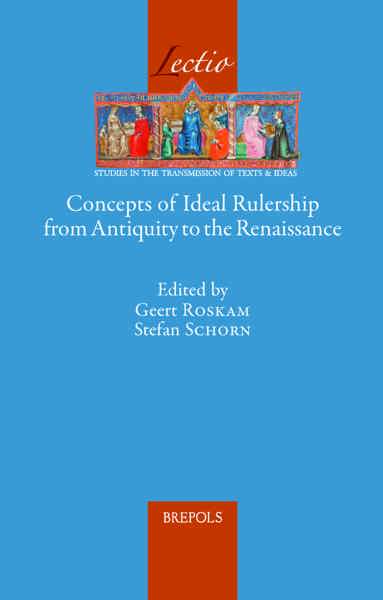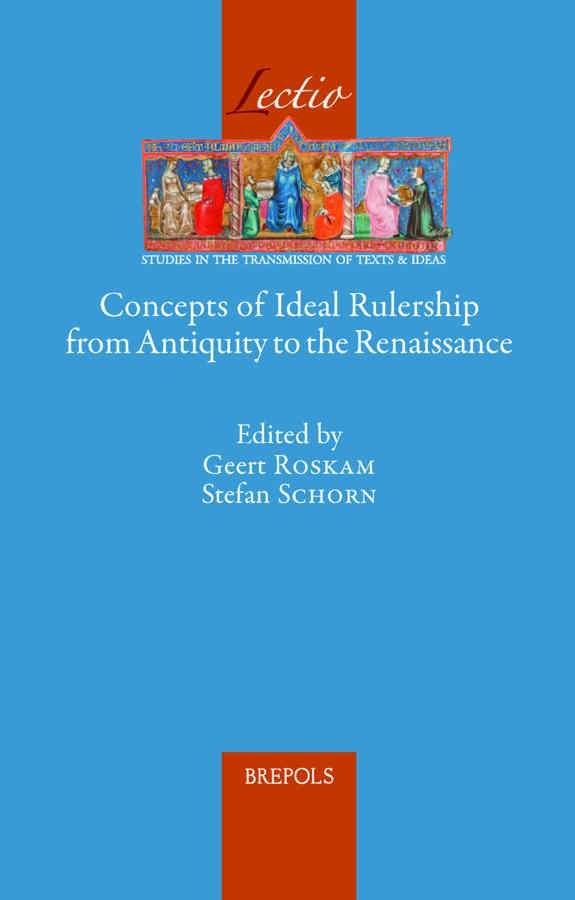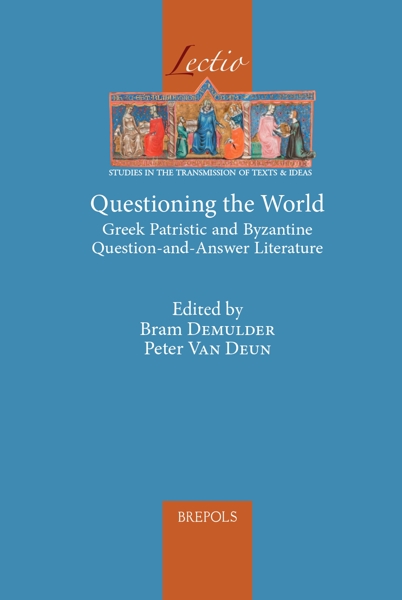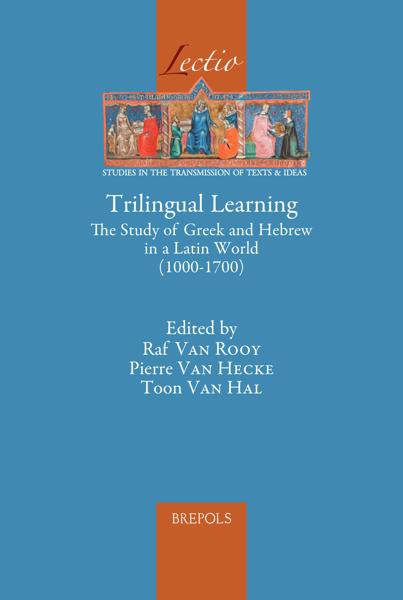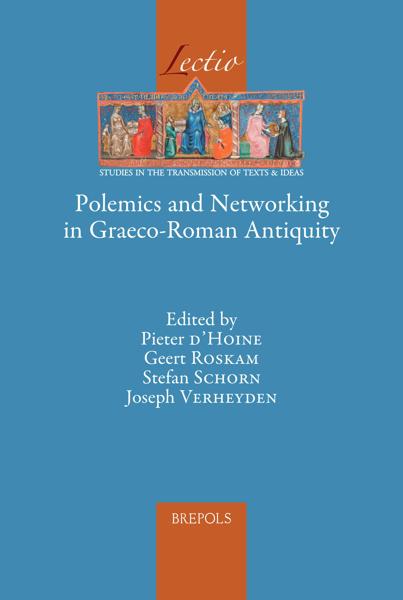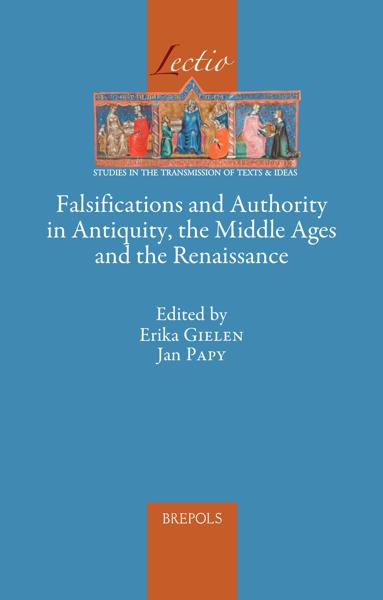
Concepts of Ideal Rulership from Antiquity to the Renaissance
Geert Roskam, Stefan Schorn (eds)
- Pages: 488 p.
- Size:156 x 234 mm
- Illustrations:4 tables b/w.
- Language(s):English, French, German
- Publication Year:2019
- € 120,00 EXCL. VAT RETAIL PRICE
- ISBN: 978-2-503-58077-7
- Hardback
- Available
- € 120,00 EXCL. VAT RETAIL PRICE
- ISBN: 978-2-503-58078-4
- E-book
- Available
“Il volume riunisce saggi molto validi ed è, a mio avviso, molto interessante e ricco di spunti di riflessione, sia per l’ampia prospettiva diacronica, sia perché riunisce competenze diverse, delineando un quadro complesso e per molti aspetti tuttora controverso; soprattutto, esso offre una serie di spunti di riflessione che solleticano «the reader’s appetite for further research»” (C. Bearzot, in Erga / Logoi, 7/2, 2019)
“(…) la raccolta e` senza dubbio una lettura molto interessante, non possiamo quindi che augurarci che seguano ulteriori studi volti ad approfondire le connessioni dei testi ‘periferici’ qui analizzati con quelli ‘centrali’ in una prospettiva ampia dal punto di vista temporale, spaziale (cioe` considerando anche letterature non di area europea) e istituzionale (ovvero esaminando realta` politiche differenti rispetto a quelle monocratiche), cosı` come, del resto, affermano pure i curatori nel loro contributo in apertura del volume.” (Alessia Grillone, in Athenaeum, II, 2023, p. 704)
Geert Roskam teaches ancient Greek literature at KU Leuven (Belgium). He has published several books on Hellenistic and Imperial philosophy.
Stefan Schorn teaches Ancient History at KU Leuven (Belgium). He is editor-in-chief of “Die Fragmente der Griechischen Historiker IV: Biography and Antiquarian Literature”.
Ancient works On Kingship have received a lot of attention in recent scholarship, where the main focus is usually on classic works such as Seneca’s On Clemency, Isocrates’ Cyprian Orations or Dio of Prusa’s Kingship Orations. In this volume, we deliberately turn to the periphery, to the grey zone where matters usually prove more complicated. This volume focuses on authors who deal with analogous problems and raise similar questions in other contexts, authors who also address powerful rulers or develop ideals of right rulership but who choose very different literary genres to do so, or works on kingship that have almost been forgotten. Departing from well-trodden paths, we hope to contribute to the scholarly debate by bringing in new relevant material and confront it with well-known and oft-discussed classics. This confrontation even throws a new light upon the very notion of ‘mirrors for princes’. Moreover, the selection of peripheral texts from Antiquity to the Renaissance reveals several patterns in the evolution of the tradition over a longer period of time.
Peripheral Perspectives on the Tradition of ‘Mirrors for Princes’ (Geert Roskam & Stefan Schorn)
Reflections and Rivalry: The Origin of the Mirror Tradition in the Platonic First Alcibiades (Albert Joosse)
Le Politique de Platon: un discours Peri basileias? (Panos Christodoulou)
Aristotle’s On Kingship and Euergetism (Brecht Buekenhout)
A Ptolemaic ‘speculum principis’ in P. Berol. inv. 13045, A I-III? (Davide Amendola)
Plutarch’s Statesmen: Mirrors of Political Effectiveness (Susan Jacobs)
La tradition du miroir au prince et la figure du bon chef chez Dion Cassius (Anne Gangloff)
The Classical Traditions of Panegyric and Advice to Princes (Oswyn Murray)
A Hall of Mirrors: The Panegyricus and the Panegyrici (Roger Rees)
Across All Boundaries of Genre? On the Uses and Disadvantages of the Term Mirror for Princes in Graeco-Roman Antiquity - Critical Remarks and Unorthodox Reflections (Matthias Haake)
Zur ‘Christianisierung’ des ‘Fürstenspiegels’ in der Spätantike: Überlegungen zur Ekthesis des Agapetos (Karen Piepenbrink)
Macedonian Mirrors: The Advice of Basil I for his Son Leo VI (Shaun Tougher)
From Royal Court to City Hall: The podestà Literature. A Republican Variant on the Mirrors for Princes? (David Napolitano)
Plato’s Advice to Alexander: Amir Khusraw’s Mirror of Alexander (1299) (Richard Stoneman)
Erasmus’ Panegyricus ad Philippum Austriae ducem (1504) (Elisa Tinelli)
Index locorum
Index nominum
